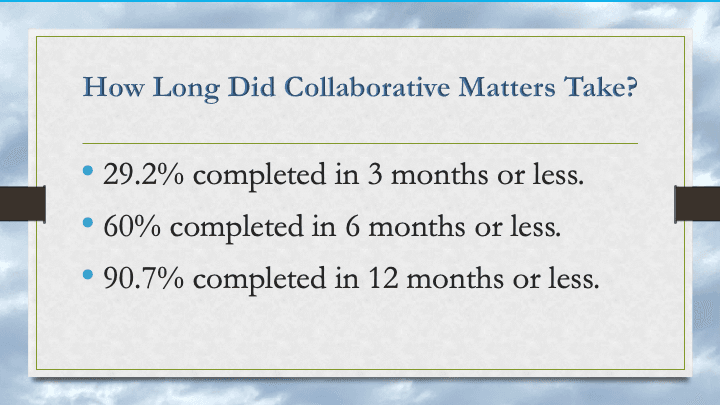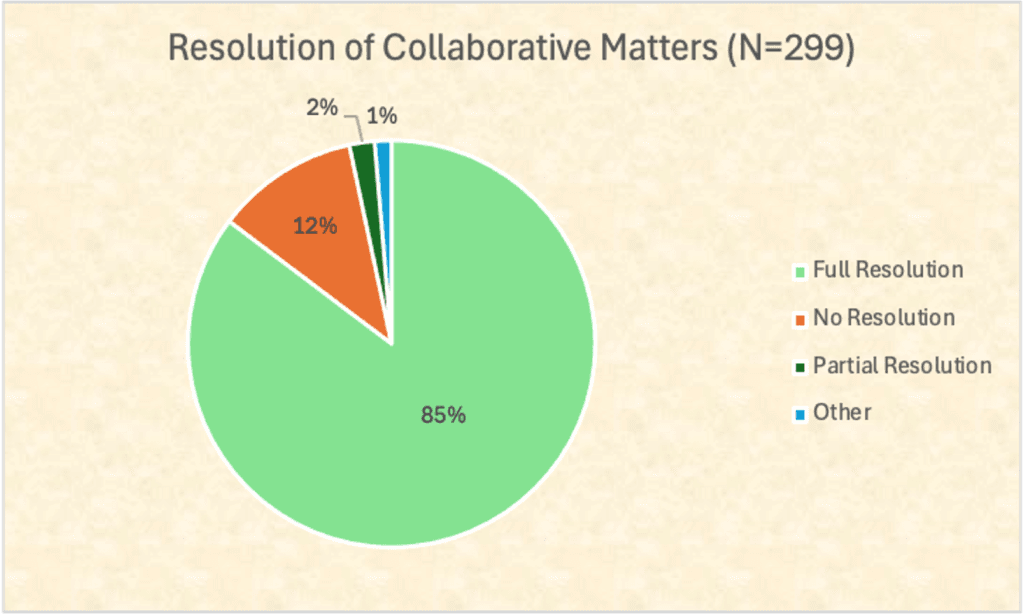What is the cost of collaborative divorce? How does the cost compare to litigation?
Instead of spending a fortune and countless months fighting in court, how much might you save for your family by successfully collaborating? Imagine if your family could save that money and time!

Ask your lawyer how much it may cost to litigate, compared with collaborating.
Every time you fight in court – to wage the initial battle, to modify support or custody, to enforce obligations, or to hold the other person in contempt – could cost thousands.
What would it mean to your family if you could avoid the time and emotions spent litigating, sometimes for years? How great if you could pursue happier, more productive things?
If you decide to resolve your issues privately (as 80% or more collaborating couples do), you could save substantial time, money, and emotional energy.
Saving Time: How Long Do Collaborative Matters Take?

Over 90% of collaborative matters completed in 12 months or less.
Source: The Florida Academy of Collaborative Professionals. Survey Results from 299 collaborative matters collected between 2014 and mid-2024.
Saving Money: How Much Does the Collaborative Divorce Process Cost?
Every matter is different. Regarding the cost of Collaborative Divorce in Florida, survey data the Florida Academy of Collaborative Professionals showed approximately 55% of collaborative matters cost $50,000 or less in total fees the couple paid for all professionals and, of those, 24% cost $30,000 or less.
Avoiding many tasks common to contested divorces reduces the cost of Collaborative Divorce.
Saving Energy: Collaborative Divorce Costs – Comparison of Collaborative Tasks to Litigation Tasks
In BOLD GREEN below are litigation tasks not necessary or typical in the Collaborative Divorce process. Read FAQs about Florida Collaborative Divorce. For more about how the Collaborative process works, read Florida Collaborative Divorce Step-By-Step.
A. Case Assessment and Workup
- Facts Investigation/Development
- Analysis/Strategy
- Experts/Consultants – Not typical in collaborative
- Document/File Management – Typically less paper in collaborative
- Legal Research
- Budgeting – More predictable in collaborative
- Other Case Activity (Including Joint & Professional Meetings)
B. Pretrial Pleadings and Motions
- Pleadings – Streamlined, minimal, and simplified in collaborative.
- Legal Research – Typically minimal in collaborative.
- Preliminary Injunctions & Provisional Remedies – Rarely necessary in collaborative.
- Court Mandated Conferences and Other Hearings – None or minimal in collaborative (the judge may want a status update).
- Dispositive Motions – Not needed in collaborative.
- Temporary Hearing and Other Hearing Preparation and Attendance – Not when couples are collaborating.
- Other Written Motions, Submissions – Written motions & submissions aren’t done in the collaborative process.
- Agreements & Judgments [Marital Settlement Agreement] – Done in both litigation and collaborative.
C. Discovery
- Mandatory Financial Disclosures under Florida Family Law Rule 12.285 – Collaborative requires transparent disclosure of documents the couple, financial neutral, and rest of the collaborative team decide are important.
- Writing document requests, interrogatories, requests for admissions – Extensive discovery litigating parties engage in, and its costs & delay isn’t needed or done in collaborative. If the team wants documents or information, they get it, often very quickly.
- Third party discovery (e.g. employer, banks) – Not needed in collaborative.
- Responding to interrogatories and document requests – Not needed in collaborative.
- Document Production – In collaborative, the neutral financial professional typically handles organization, indexing, and summarizing essential financial documents & information.
- Depositions:
- Party1’s deposition – not done in collaborative.
- Party2’s deposition – not done in collaborative.
- Nonexpert Witnesses – not done in collaborative.
- Expert Depositions
- Party1’s expert’s deposition – not done in collaborative.
- Party2’s expert’s deposition – not done in collaborative.
- Discovery Motions – not done in collaborative.
D. Mediation, Trial Preparation, and Trial
- Mediation Statement and Conference – On occasion, collaborating teams use collaborative mediation to work through “sticky” unresolved issues after most others have been resolved.
- Pre-trial Statement Preparation – not done in collaborative.
- Witness List Preparation – not done in collaborative.
- Exhibit List Preparation – not done in collaborative.
- Preparation Fact Witnesses – not done in collaborative.
- Preparation Expert Witnesses -not done in collaborative.
- Written Motions and Submissions (e.g., Motions in limine) -not done in collaborative.
- Other Trial Preparation and Support – not done in collaborative.
- Trial and Hearing Attendance – not done in collaborative.
- Post-Trial Motions and Submissions (e.g., proposed findings of fact, conclusions of law, final judgment, motion for rehearing, motion for reconsideration) – not done in collaborative.
E. Appeal and Remand – not done in collaborative.
- Appellate Motions and Submissions
- Appellate Briefs
- Oral Argument
- Remand – Insufficient findings, incorrect ruling.
F. Expenses
- Expert Fees (evaluator, Guardian Ad Litem, accountant) – A GAL is not needed in collaborative. Occasionally, an evaluation might help the process.
- Private Investigator – Not needed in collaborative.
- Travel to depositions, hearings, and trial – Travel in collaborative is to meetings and to a final hearing, if the judge even requires an appearance.
- Transcripts and Video copies – Not in collaborative.
- Demonstrative Exhibits, PowerPoints, etc. – The financial neutral typically presents worksheets & exhibits using standard software.
- Copying, etc – Greatly reduced in collaborative practice.
- Other (Including Filing Fees).
Reaching Agreement: How Effective Was the Collaborative Process?

Source: The Florida Academy of Collaborative Professionals
Updated statistics on Florida Collaborative Divorce, its success rate, duration, cost, and demographics appear in the Fall 2025 issue of the Family Law Commentator, published by the Family Law Section of The Florida Bar.
The data come from survey responses the Florida Academy of Collaborative Professionals (FACP) collected between 2014 and mid-2024 for 299 collaborative matters.
